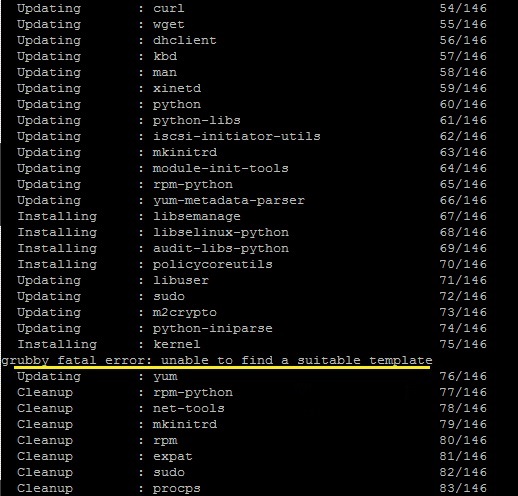Grubby Fatal Error: Unable to Find a Suitable Template
Updated:
The system update using the “yum update” command on certain cloud-based Linux systems triggered the error message “Grubby Fatal Error: Unable to Find a Suitable Template”. This post aims to detail the resolution process for this issue.
Details of Grubby Fatal Error
I’ve noticed that this problem commonly impacts cloud-based Linux systems, particularly those running CentOS and Fedora, on cloud hosting platforms such as DigitalOcean.
The images below are the captured screens that display the fatal error message.
On CentOS:

On Fedora:

Root Cause of Grubby Fatal Error
GRUB stands for Grand Unified Bootloader. The occurrence of the “Grubby Fatal Error” stems from a discrepancy in the configuration of CentOS and Fedora templates provided by certain cloud hosting providers. Despite these providers not utilizing GRUB as their bootloader, remnants of GRUB configuration persist within the system’s setup. Specifically, the inclusion of the GRUB menu interface configuration file in these templates leads to the error message. Rectifying this issue involves the removal of the configuration file, “grub.conf,” thereby enabling the successful updating of the Linux kernel without encountering the “Grubby Fatal Error: Unable to Find a Suitable Template.”
It’s a common practice among cloud providers to furnish users with pre-configured images of prevalent operating systems such as CentOS and Fedora. In the pursuit of convenience, some providers may opt to clone these images from other platforms. This process is technically feasible and aligns with industry norms. Additionally, cloud providers frequently tailor these operating system images to suit their unique infrastructure and service requirements. Consequently, they may opt to modify CentOS and Fedora images, including substituting the bootloader with an alternative to GRUB. However, oversights can occur during this customization process, potentially resulting in the retention of GRUB-related configuration files and symbolic links despite the removal of GRUB itself.
This oversight can manifest in errors during system updates, particularly if the update process attempts to modify non-existent GRUB configurations. Hence, the “grubby fatal error” may surface, indicating the inability to locate a suitable template for updating. Resolving this issue necessitates the proactive removal of residual GRUB configuration files and symbolic links before initiating system updates. By eliminating these remnants, the update process proceeds unhindered, circumventing the “Grubby Fatal Error” altogether.
How to Deal with Grubby Fatal Error
if GRUB is not used on the system, removing the grub.conf file should be safe. However, it’s always a good practice to double-check and ensure that no other bootloader or boot configuration is in use before deleting any system files. If you’re uncertain, you can also move the file to a backup location instead of deleting it permanently, like so:
sudo mv /boot/grub/grub.conf /boot/grub/grub.conf_backup
Before running the very first update on your CentOS or Fedora systems, remove file “/boot/grub/grub.conf” with the following “rm” command.
sudo rm /boot/grub/grub.conf
Optionally, remove the symbolic link “/etc/grub.conf” with the following command line.
sudo rm /etc/grub.conf
And then update your systems.
sudo yum update
If you follow the steps above, you should be able to update the kernel without seeing the “Grubby Fatal Error” message.
I hope this article will help those who have run into the same issue when doing an update on CentOS or Fedora servers. On the other hand, cloud hosting providers should look into this issue and probably update their Linux images if GRUB is not in use.